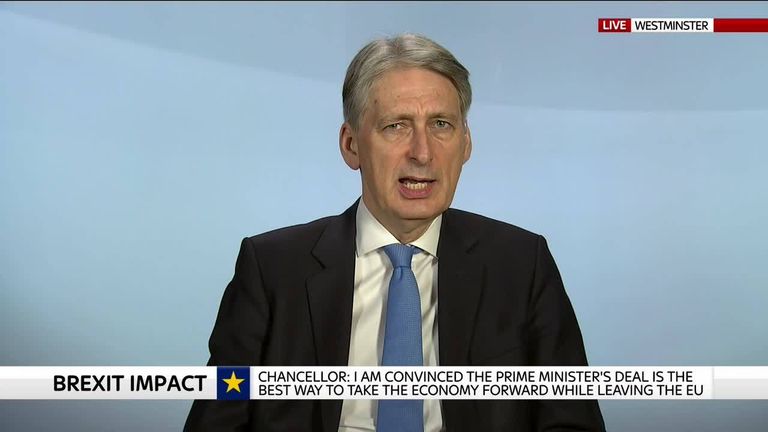PM: Brexit deal leaves UK 'better off' despite dire economic forecasts
Theresa May uses Whitehall economic analysis to continue to press the case for her EU agreement ahead of MPs' crunch vote.
Wednesday 28 November 2018 22:46, UK
Theresa May has claimed her Brexit deal will leave the UK "better off" as she defended her agreement in the face of official economic forecasts predicting a hit to growth.
Quitting the EU under the government's plans could cut the UK's gross domestic product (GDP) by between 2.5% and 3.9% compared to staying in the bloc, work by the Treasury and other Whitehall departments revealed.
An 83-page document published on Wednesday did not provide a specific analysis of the Brexit deal the prime minister is trying to push through parliament.
But it analysed the likely impact of the proposals agreed by the cabinet at Chequers in July and set out in the government's subsequent white paper.
It also modelled the impact of the UK securing a Norway-style relationship with the EU after Brexit, a Canada-style free trade agreement with the bloc, and the effect of a "no deal" Brexit.
In every scenario, the UK economy was predicted to grow over the next 15 years, but not as fast as it would have done without leaving the EU.
A no deal Brexit could see economic growth up to 10.7% less, the analysis said.
:: Pound to crash, inflation to soar in 'no deal' Brexit - BOE warns
Mrs May used the analysis to continue to press the case for her Brexit deal, as she faces a battle to convince MPs to back her agreement in a House of Commons vote on 11 December.
Speaking during Prime Minister's Questions, she said: "The analysis does not show that we will be poorer than the status quo today.
"What the analysis shows is that this is a strong economy that will continue to grow and that the model that actually delivers best on delivering the vote of the British people - and for our jobs and our economy - is the model that the government have put forward."
In an interview with Sky News earlier, Chancellor Philip Hammond said the analysis showed the prime minister's Brexit deal offers the political benefits of being outside the EU with "very little economic cost".
The Whitehall document was followed later on Wednesday by the publication of even more dramatic predictions by the Bank of England.
It claimed a disorderly no deal Brexit could see the UK economy shrink by nearly 8%, the price of the pound plummet, a 30% slump in house prices, unemployment nearly doubling and inflation spiralling to 6.5%.
Bank of England governor Mark Carney stressed the work did not represent a forecast but was instead a "worst-case version" of a no deal Brexit in order to help him "be prepared for all eventualities".
He also reported the UK banking system is strong enough to withstand a disorderly Brexit.
But, Mr Carney's explanation of the bank's work did not satisfy Brexiteers.
Leading Tory eurosceptic Jacob Rees-Mogg branded the bank governor a "second-tier Canadian politician who failed to get on in Canadian politics and got a job in the UK".
He told Sky News: "I don't think he's greatly respected and he's been deeply politicised to the damage of the Bank of England's reputation."
The analysis has been released as the Transport Secretary Chris Grayling announced the UK and US have agreed a new "open skies" deal for post-Brexit flights.
The arrangement ensures airlines flying between the countries will enjoy the same access they currently have.
Those wanting a second Brexit referendum used the dual economic analysis to push their claim for a fresh public vote on EU membership.
With the prime minister estimated to be more than 60 votes short of the majority she needs for the House of Commons to approve her Brexit deal, Labour shadow chancellor John McDonnell suggested a new referendum might be "inevitable".
Admitting it will be "very difficult" to force a general election even if MPs vote down the Brexit deal, Mr McDonnell told the BBC: "If that's not possible we'll be calling on the government then to join us in a public vote.
"And, again, it's difficult to judge at each stage. But that's the sequence I think that we'll inevitably go through over this period."
Speaking on a trip to Scotland later, as she continues her tour of the UK in a bid to sell her agreement, the prime minister claimed Mr McDonnell's comments represented "the true position of the Labour Party".
"Labour just want to frustrate Brexit, they want to go against and overturn the vote of the British people," she said.
Prior to the crunch Brexit vote on 11 December, Mrs May could be facing a further headache.
House of Commons Speaker John Bercow said he would consider whether the government has acted in "contempt" of parliament if it continues to refuse to publish the full legal advice on the withdrawal agreement.
Late on Wednesday, the government revealed it would accept up to six amendments to the motion on which MPs will hold their "meaningful vote" on the Brexit deal, which could prompt last-ditch efforts for a second referendum or a "soft" Brexit.








